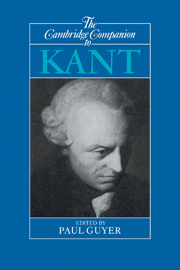Book contents
- Frontmatter
- Introduction
- 1 Kant's intellectual development
- 2 The Transcendental Aesthetic
- 3 Functions of thought and the synthesis of intuitions
- 4 The transcendental deduction of the categories
- 5 Causal laws and the foundations of natural science
- 6 Empirical, rational, and transcendental psychology
- 7 Reason and the practice of science
- 8 The critique of metaphysics
- 9 Vindicating reason
- 10 Autonomy, obligation, and virtue
- 11 Politics, freedom, and order
- 12 Taste, sublimity, and genius
- 13 Rational theology, moral faith, and religion
- 14 The first twenty years of critique
- Bibliography
- Index
1 - Kant's intellectual development
1746-1781
Published online by Cambridge University Press: 28 May 2006
- Frontmatter
- Introduction
- 1 Kant's intellectual development
- 2 The Transcendental Aesthetic
- 3 Functions of thought and the synthesis of intuitions
- 4 The transcendental deduction of the categories
- 5 Causal laws and the foundations of natural science
- 6 Empirical, rational, and transcendental psychology
- 7 Reason and the practice of science
- 8 The critique of metaphysics
- 9 Vindicating reason
- 10 Autonomy, obligation, and virtue
- 11 Politics, freedom, and order
- 12 Taste, sublimity, and genius
- 13 Rational theology, moral faith, and religion
- 14 The first twenty years of critique
- Bibliography
- Index
Summary
THE PROBLEM OF METAPHYSICS IN EIGHTEENTHCENTURY Germany
Kant's early philosophical career before the publication of the Critique of Pure Reason in May 1781 was dominated by an unhappy love affair. “I have had the fate to be in love with metaphysics,” Kant wrote ruefully in 1766, “although I can hardly flatter myself to have received favors from her.” This preoccupation with metaphysics provided the leitmotif, and indeed the underlying drama, behind Kant's early intellectual development. We can divide his career into four phases according to whether he accepted or rejected the blandishments of his mistress. The first phase, from 1746 to 1759, is the period of infatuation. During these years Kant's chief aim was to provide a foundation for metaphysics. Accordingly, he developed a rationalist epistemology that could justify the possibility of knowledge of God, providence, immortality, and the first causes of nature. The second phase, from 1760 to 1766, is the period of disillusionment. Kant broke with his earlier rationalist epistemology and inclined toward skepticism, utterly rejecting the possibility of a metaphysics that transcends the limits of experience.
- Type
- Chapter
- Information
- The Cambridge Companion to Kant , pp. 26 - 61Publisher: Cambridge University PressPrint publication year: 1992
- 20
- Cited by



